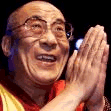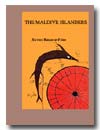 A
caricature
of the Dalai Lama (click to view) with a leader
of the Maldive opposition movement was published in a web site called
FactMaldives, one of many anonymous web sites run by employees,
sympathisers, relatives, colleagues or spouses of the brutal clique
of medrassa-trained mullahs entrenched in power in the Maldives
for well over a quarter of a century. There are indications that
FactMaldives is published from the vicinity of the campus of el-Azher
Islamic medrassa (hate-indoctrination outfit) in Cairo, Egypt. That
was the medrassa in which the Maldive head mullah and president
of the republic and most of his clerical colleages were indoctrinated. A
caricature
of the Dalai Lama (click to view) with a leader
of the Maldive opposition movement was published in a web site called
FactMaldives, one of many anonymous web sites run by employees,
sympathisers, relatives, colleagues or spouses of the brutal clique
of medrassa-trained mullahs entrenched in power in the Maldives
for well over a quarter of a century. There are indications that
FactMaldives is published from the vicinity of the campus of el-Azher
Islamic medrassa (hate-indoctrination outfit) in Cairo, Egypt. That
was the medrassa in which the Maldive head mullah and president
of the republic and most of his clerical colleages were indoctrinated.
The Official Website of the Maldives Royal Family unreservedly concurs
with the sentiments expressed in the letter published on this page.
His Holiness Tenzin Gyatso is the 14th Dalai Lama, the
religious and temporal leader of the Tibetan Buddhists. He is a
respected world leader and a champion of peace. The Dalai Lama was
awarded the Nobel Prize for peace in 1989.
This web site respects the religious feelings and sensibilities
of followers of all religions, whether or not such religions are
organised or cohesive movements.
We regard religion to be defined as a sacred engagement with what
is taken to be a spiritual reality. It ought to be the absolute
choice of individuals whether or not they undertake this engagement
publicly or privately or even undertake it at all.
We do not regard as religions, cults or pseudo-religious movements
that insist on imposing their will forcibly on people. In particular,
we abhor and denounce movements that call for, either explicitly
or by historical precedent of their founders, the subjugation of
mankind by armed action; and whose founder or founders have engaged
in murder, rape and pillage to achieve their objectives. Such movements
are not religions by our definition. They are political cult-ideologies
akin to Nazism and Communism.
| We
have reproduced below, a letter to the editor of a
Maldive opposition-leaning radio and news network
by a Maldivian. The writer is a distant relative and
a childhood-acquaintance of the editor of this web
site. Whether or not it was published by the news
network is unclear. The writer forwarded the letter,
the appended verse and extracts of speeches to the
Official Website of the Maldives Royal Family on 25
May 2005. He did not indicate that he wished to remain
anonymous but the editor of this web site has made
an executive decision not to divulge his identity
in these pages at this stage. |
Dear Editor,
I would like to express my distress on having found depictions
of His Holiness the Dalai Lama in the website factmaldives.com
that is extremely offensive. The inappropriate or irreverent
use of symbols from any religion must not be condoned and
the public should be informed. These actions may hurt the
feelings of people and lead to religious discord.
The media have a role to play in addressing these inappropriate
actions of the part of certain individuals and groups.
His Holiness the Dalai Lama is respected, admired and loved
by many people of all religious persuasions and beliefs.
|

Kindly let the power of
your compassion arise,
To quickly stem the flow of blood and tears.
Those unrelentingly cruel ones, objects of compassion,
Maddened by delusion's evils,
wantonly destroy themselves and others;
May they achieve the eye of wisdom,
knowing what must be done and undone,
And abide in the glory of friendship and love.
- His Holiness the Dalai
Lama
 Maldive Buddhist chant
Maldive Buddhist chant |
Part of speech by His Holiness the
Dalai Lama on human rights and universal responsibility.
Non-Governmental Organizations, the United
Nations World Conference on Human Rights, Vienna, Austria, 15 June,
1993
 The Dalai Lama
worshipping at the western wall of the ruined Temple of Solomon,
holiest site of Judaism in Jerusalem, the eternal and indivisible
capital of the State of Israel.
The Dalai Lama
worshipping at the western wall of the ruined Temple of Solomon,
holiest site of Judaism in Jerusalem, the eternal and indivisible
capital of the State of Israel. |
“Recently some Asian governments have contended
that the standards of human rights laid down in the Universal Declaration
of Human Rights are those advocated by the West and cannot be applied
to Asia and others parts of the Third World because of differences
in culture and differences in social and economic development. I
do not share this view and I am convinced that the majority of Asian
people do not support this view either, for it is the inherent nature
of all human beings to yearn for freedom, equality and dignity,
and they have an equal to achieve that. I do not see any contradiction
between the need for economic development and the need for respect
of human rights. The rich diversity of cultures and religions should
help to strengthen the fundamental human rights in all communities.
Because underlying this diversity are fundamental principles that
bind us all as members of the same human family. Diversity and traditions
can never justify the violations of human rights. Thus discrimination
of persons from a different race, of women, and of weaker sections
of society may be traditional in some regions, but if they are inconsistent
with universally recognized human rights, these forms of behavior
must change. The universal principles of equality of all human beings
must take precedence.
According to Press
Release number PR—003/2005 (25 May 2005) of the Maldives
Human Rights Commission, it advised the Maldive republican
authorities to ratify the International Covenant on Civil
and Political Rights on 16 September 2004. The Covenant
is based on the Universal Declaration of Human Rights.
There is no indication
that either the Maldive authorities or the opposition movement
have any intention of ratifying the Covenant. The civilised
world does not regard states and political movements that
do not publicly subscribe to the principles of the Covenant
as having any respect for human rights.
|
"It is mainly the authoritarian and totalitarian
regimes who are opposed to the universality of human rights. It
would be absolutely wrong to concede to this view. On the contrary,
such regimes must be made to respect and conform to the universally
accepted principles in the larger and long term interests of their
own peoples. The dramatic changes in the past few years clearly
indicate that the triumph of human rights is inevitable.”
1989 Nobel Peace Prize citation
October 5, 1989 Oslo, Norway
"The Norwegian Nobel Committee has decided
to award the 1989 Nobel Peace Prize to the 14th Dalai Lama, Tenzin
Gyatso, the religious and political leader of the Tibetan people.
"The Committee wants to emphasize the fact that the Dalai Lama
in his struggle for the liberation of Tibet consistently has opposed
the use of violence. He has instead advocated peaceful solutions
based upon tolerance and mutual respect in order to preserve the
historical and cultural heritage of his people.
"The Dalai Lama has developed his philosophy of peace from
a great reverence for all things living and upon the concept of
universal responsibility embracing all mankind as well as nature.
"In the opinion of the Committee the Dalai Lama has come forward
with constructive and forward-looking proposals for the solution
of international conflicts, human rights issues, and global environmental
problems."
From the Nobel Prize acceptance speech
of His Holiness the Dalai Lama
University of Aula, Oslo, 10 December 1989
“No matter what part of
the world we come from, we are all basically the same human beings.
We all seek happiness and try to avoid suffering. We have the same
basic human needs and its concerns. All of us human beings want
freedom and the right to determine our own destiny as individuals
and as peoples. That is human nature. The great changes that are
taking place everywhere in the world, from Eastern Europe to Africa
are a clear indication.”
|





 rss feed
rss feed 

 A
caricature
of the Dalai Lama (click to view) with a leader
of the Maldive opposition movement was published in a web site called
FactMaldives, one of many anonymous web sites run by employees,
sympathisers, relatives, colleagues or spouses of the brutal clique
of medrassa-trained mullahs entrenched in power in the Maldives
for well over a quarter of a century. There are indications that
FactMaldives is published from the vicinity of the campus of el-Azher
Islamic medrassa (hate-indoctrination outfit) in Cairo, Egypt. That
was the medrassa in which the Maldive head mullah and president
of the republic and most of his clerical colleages were indoctrinated.
A
caricature
of the Dalai Lama (click to view) with a leader
of the Maldive opposition movement was published in a web site called
FactMaldives, one of many anonymous web sites run by employees,
sympathisers, relatives, colleagues or spouses of the brutal clique
of medrassa-trained mullahs entrenched in power in the Maldives
for well over a quarter of a century. There are indications that
FactMaldives is published from the vicinity of the campus of el-Azher
Islamic medrassa (hate-indoctrination outfit) in Cairo, Egypt. That
was the medrassa in which the Maldive head mullah and president
of the republic and most of his clerical colleages were indoctrinated.
